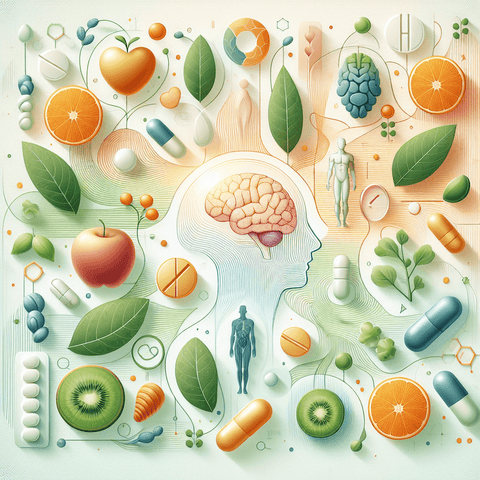Introduction
Maintaining optimal vitamin levels plays a critical role in overall health and wellbeing. Vitamins are essential micronutrients that contribute to various bodily functions, including immune support, energy production, bone health, and cognitive performance. When we lack adequate levels of key vitamins, it may lead to a variety of health concerns, both physical and mental. Despite having access to a wide variety of foods, vitamin deficiencies remain prevalent around the world. This can be due to several factors including poor dietary choices, limited absorption due to gastrointestinal issues, medical conditions, or lifestyle-related stressors. In many cases, even those consuming what appears to be a balanced diet can fall short in meeting their nutritional needs. Nutritional supplements offer a practical solution to bridge these nutrient gaps. At topvitamine.com, we focus on high-quality, science-backed supplements designed to support your health goals. However, before choosing the right supplement, it's essential to know what your body truly needs. This article will guide you through identifying potential vitamin deficiencies by outlining common signs and symptoms, exploring diagnostic options, and offering expert tips to restore balance. Whether you're experiencing low energy, recurring illness, mental fog, or skin concerns, this guide can help you understand what your body might be missing and how to address it effectively.I. Understanding Vitamin Deficiencies and Their Impact on Your Health
Vitamin deficiencies occur when the body does not receive or absorb enough of specific vitamins to function properly. Though usually subtle at the onset, deficiencies can lead to short-term discomfort and long-term complications if left unaddressed. Commonly affecting groups such as the elderly, vegetarians, individuals with chronic health conditions, and those with restricted diets, vitamin shortages are increasingly recognized as silent contributors to common health complaints. There are various causes of vitamin deficiencies. A nutritionally poor diet that lacks fruits, vegetables, whole grains, and lean proteins is often the primary culprit. Other contributing factors include gastrointestinal disorders like Crohn’s disease or celiac disease, which hinder nutrient absorption, as well as medications that interfere with the uptake or metabolism of vitamins. Lifestyle aspects such as smoking, alcohol consumption, high stress, and lack of sun exposure (for vitamin D) can also exacerbate the likelihood of vitamin gaps. The health implications of untreated vitamin deficiencies are significant. For example, insufficient vitamin D may lead to decreased bone density over time, while a lack of vitamin B12 can result in neurological symptoms and fatigue. Vitamin A shortages can result in poor vision, while inadequate vitamin C may impair immune function and delay wound healing. Thankfully, nutritional supplements provide a powerful tool for individuals looking to support their vitamin intake. By choosing the right forms and dosages based on individual needs, supplements can help maintain physiological balance and prevent nutrient-related health issues. For example, supplementing with omega-3 EPA and DHA from topvitamine.com’s Omega-3 collection can support heart and brain health, while their broad assortment of vitamin-D products can help replenish levels in individuals with limited sun exposure. Understanding the signs of deficiency, knowing what to test for, and making informed choices about diet and supplementation are the first steps toward a healthier future.II. Recognizing Vitamin Deficiency Symptoms, Signs of Nutrient Deficiency, Diagnosing Vitamin Gaps, Recognizing Vitamin Shortage, Identifying Vitamin Deficiency
A. Fatigue and Low Energy Levels — Signs of Nutrient Deficiency
One of the most common and often overlooked symptoms of vitamin deficiency is persistent fatigue. While it's normal to feel tired occasionally due to lack of sleep or overexertion, chronic fatigue that persists despite rest may indicate a nutritional shortfall. Vitamins such as B12 and D play critical roles in maintaining our energy levels. Vitamin B12 helps produce red blood cells which carry oxygen throughout the body; a deficiency in B12 can result in feelings of weakness, lethargy, and even shortness of breath. Vitamin D, on the other hand, affects muscle function, immunity, and mood — with low levels often associated with seasonal affective disorder and energy depletion. Differentiating fatigue caused by lifestyle factors from that caused by vitamin deficiency can be tricky. Pay attention to associated symptoms such as paleness, dizziness, muscle weakness, or irritability. These may be red flags pointing to an underlying deficiency. Blood tests are a simple way to assess your vitamin B12 and D status. If you suspect these are lacking, consult with your physician for proper screening. Once confirmed, tailored supplementation, such as those available in our vitamin D collection, can help replenish stores and improve energy levels.B. Skin Problems and Hair Loss — Recognizing Vitamin Shortage
Your skin and hair serve as external indicators of your internal health. Deficiencies in vitamins such as biotin (vitamin B7), vitamin A, and zinc can significantly influence how your skin and hair look and feel. Biotin is often referred to as the "beauty vitamin" due to its role in keratin production. Insufficient biotin may result in brittle nails, dry skin, and hair thinning. Similarly, vitamin A assists in skin regeneration and immunity; its deficiency can cause flaky skin, acne, and delayed wound healing. Zinc also plays a major role in collagen formation and hair follicle support — its absence may lead to inflammation, dermatitis, and hair shedding. Environmental factors like pollution, harsh cosmetic products, or poor hydration can worsen these symptoms, but consistent issues are often tied to what's missing from your diet. If you notice sudden changes in skin texture, increased hair fallout, or unexplained breakouts, it may be time to assess your vitamin intake. A healthcare professional can recommend specific tests, and based on the results, targeted supplementation can help restore skin and hair vitality. Ensuring a well-balanced diet is key, but in some cases, high-quality targeted supplements can offer faster restoration.C. Frequent Infections and Poor Immune Function — Diagnosing Vitamin Gaps
If you find yourself frequently battling colds, flu, or other infections, your immune system might not be getting the nutrients it needs. Vitamins including C, D, and zinc are vital for immune resilience. Vitamin C supports white blood cell function and acts as a powerful antioxidant. Vitamin D helps regulate immune responses and is particularly vital in colder months when sun exposure is minimal. Zinc, too, plays a central role in how our body responds to pathogens. Signs of potential immune-related deficiencies include delayed recovery times, recurrent respiratory or urinary infections, and general malaise. If your diet is lacking in fruits and vegetables (for vitamin C) or you rarely spend time in the sun (for vitamin D), you might be at increased risk. Consider adding foods high in these nutrients to your diet, or choose appropriate supplements. Our vitamin C supplements might be an excellent addition for those with dietary restrictions or high oxidative stress.D. Cognitive Difficulties and Mood Changes — Recognizing Vitamin Deficiency
Cognitive fog, forgetfulness, irritability, and mood swings are often misattributed to stress or aging but can actually arise from nutritional deficiencies, particularly in vitamins B12, B6, and folate (B9). These B-complex vitamins support neurotransmitter production, energy metabolism, and brain health. A B12 shortage may even mimic early signs of dementia or depression. Folate is crucial for fetal brain development and maintaining mental balance in adults. When mental symptoms are accompanied by physical signs such as tingling extremities, memory gaps, or difficulties concentrating, testing for B vitamin levels is advised. Especially for vegetarians or individuals with absorption issues, supplementation with bioavailable forms of these vitamins can provide noticeable improvements. Pairing smart supplementation with a diet rich in dark leafy greens, legumes, and lean proteins can reinforce cognitive and emotional wellness.E. Bone Weakness and Muscle Weakness — Recognizing Vitamin Shortage
Vitamins D and K are essential for maintaining bone density and muscular strength. A deficiency in either can increase the risk of osteoporosis, fractures, or chronic muscle aches. Vitamin D facilitates calcium absorption in the gut, while vitamin K plays a role in ensuring that calcium is directed to your bones rather than soft tissues. A lifestyle that includes limited sun exposure, sedentary patterns, and low intake of leafy vegetables may contribute to these deficiencies. Signs may include bone tenderness, frequent falls, difficulty climbing stairs, or slow healing. A bone density scan (DEXA) combined with lab tests can offer clarity on deficiencies. Support your skeletal system with appropriate supplementation found in our vitamin K collection and vitamin D supplements, especially if you're over 50 or have a family history of bone disease.F. Digestive Issues and Nutrient Absorption Problems — Identifying Vitamin Deficiency
Your gastrointestinal (GI) health directly affects your ability to absorb vitamins. Chronic issues such as bloating, diarrhea, or constipation may indicate deficiencies—not just consequences of an underlying condition but causes of further nutritional loss. Vitamin B12 and magnesium are especially susceptible to malabsorption. B12 requires intrinsic factor, a protein made in the stomach, to be properly absorbed. Individuals with gastritis, IBS, or those taking acid-reducing medication are at higher risk. Magnesium supports over 300 enzymatic reactions, including muscle and digestive function. Poor gut health and low-quality diets make it difficult to retain essential nutrients. If gastrointestinal issues persist, tests for vitamin absorption and microbiome analysis can be insightful. Incorporating targeted supplements like those in our Magnesium collection can help complement a comprehensive treatment strategy.G. Bleeding Gums and Swollen Tongue — Signs of Nutrient Deficiency
Oral health concerns such as bleeding gums, inflamed tongue (glossitis), mouth ulcers, or dry mouth may indicate a deficiency in vitamins C or K. Vitamin C is essential for collagen synthesis and capillary strength. Low levels can lead to soft, bleeding gums and slow wound healing. Similarly, vitamin K is responsible for blood clotting. Its lack may result in prolonged bleeding from minor abrasions or brushing your teeth. These early warning signs often precede more serious issues and should prompt immediate evaluation. Correcting a deficiency can significantly improve oral health outcomes. Increasing intake through diet and quality supplements may offer quicker results.H. Vision Problems and Night Blindness — Recognizing Vitamin Shortage
Difficulty seeing clearly at night or adjusting to low-light conditions may signal low levels of vitamin A. This fat-soluble vitamin supports healthy vision by producing pigment in the retina. In severe cases, deficiency can progress to impaired immune responses and even irreversible vision impairment. It’s more common in people with fat-malabsorption conditions or severe dietary restrictions. Other signs may include dry eyes, frequent eye infections, or sensitivity to light. Routine eye exams, along with blood work assessing vitamin A levels, can help determine the cause. Including vitamin A-rich foods like carrots, spinach, and liver in your diet is advisable, but for those with limited dietary options, consider a high-quality supplement formulated with bioavailable vitamin A.III. How to Determine Which Vitamins You Are Lacking
Jumping to conclusions without measurable evidence is risky. Self-diagnosing a vitamin deficiency based on symptoms alone can lead to incorrect supplementation. That’s why professional medical assessments should be your first step. Blood tests, such as a complete nutrient panel, will accurately reveal which nutrients fall below optimal levels. These may include assessments for vitamins B12, D, A, E, C, folate, magnesium, and zinc. Keeping a food and symptom diary for one to two weeks prior to your doctor’s visit can help create a more comprehensive picture. Your diet, symptoms, and lifestyle habits all provide vital clues. Dietitians and healthcare providers use this data to establish tailored nutrition and supplementation plans. By identifying both the cause and consequence of deficiencies, long-term health improvements become feasible. Testing is particularly important before taking mega-doses of supplements.IV. Using Supplements Wisely: How to Address Vitamin Gaps
Once your deficiencies are confirmed, incorporating science-backed supplements can be highly beneficial. However, supplementation is not a one-size-fits-all solution. Personalized plans that account for age, sex, diet, medications, and underlying health conditions enhance efficacy and safety. Start with lower doses and work your way up as needed, always adhering to upper intake levels designated by regulatory bodies. Avoid combining multiple supplements with overlapping ingredients to reduce the risk of over-supplementation and unwanted interactions. Combining vitamin-rich foods with appropriate supplements ensures a sustainable and effective approach. Topvitamine.com offers targeted, high-quality products tailored to specific needs. Explore the full range of categories to find relevant supplements that align with your test results and health goals.V. Preventing Vitamin Deficiencies
The best way to prevent vitamin deficiencies is through a proactive and sustainable lifestyle. Focus on a diet filled with colorful vegetables, fruits, whole grains, ethical protein sources, and healthy fats. Reduce processed food intake and monitor your hydration levels. Regular exercise, stress management, adequate sleep, and digestive health all influence how nutrients are absorbed and distributed. Periodic lab tests can help catch early trends before they progress to full deficiencies. Make it a habit to evaluate your nutrient intake at least once a year, especially if you follow a restrictive diet such as vegan, keto, or gluten-free. Supplement where gaps are identified to prevent deterioration in health and vitality.Conclusion
Recognizing the early signs of vitamin deficiencies enables you to take control of your health journey. Symptoms such as fatigue, skin changes, poor immunity, cognitive issues, and digestive complaints serve as your body’s signals. Listen to them. Rather than self-diagnosing, rely on proper lab testing and expert guidance. Personalized nutrition and supplementation can bridge gaps, restore balance, and contribute to lasting wellbeing. The array of expertly curated products at topvitamine.com offers reliable, high-quality options for anyone looking to enhance their wellness journey. Your body deserves the best support. Make informed choices, monitor your health, and never hesitate to seek professional guidance when addressing nutrient needs.Call to Action
Ready to take charge of your health? Schedule a comprehensive nutritional assessment with your healthcare provider today. Then explore the well-researched supplement collections on topvitamine.com to help restore optimal vitamin levels. Support your body with the nutrients it needs and stay educated on the latest in wellness and nutrition by following our updates.Q&A Section
Q: What are the most common vitamin deficiencies?A: The most common deficiencies include vitamin D, B12, iron, magnesium, and vitamin C. These vary by diet, lifestyle, and individual health factors. Q: How can I test for vitamin deficiencies?
A: Talk to your doctor about getting a blood test that includes basic panels plus specific vitamins like D, B12, and folate. A food diary and symptoms log are also useful tools. Q: Can I self-diagnose and use supplements to fix the problem?
A: It’s always best to consult a healthcare provider before starting any supplement regimen to avoid overuse and ensure proper dosage. Q: Are supplements necessary if I eat a balanced diet?
A: In some cases, yes. Even with a balanced diet, certain conditions or lifestyle factors may impair absorption. Supplements act as insurance for specific deficiencies. Q: Where can I buy high-quality vitamin supplements?
A: Visit topvitamine.com for an array of science-backed vitamin and mineral supplements, including collections tailored to bone, immune, and energy support.



